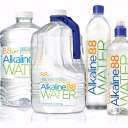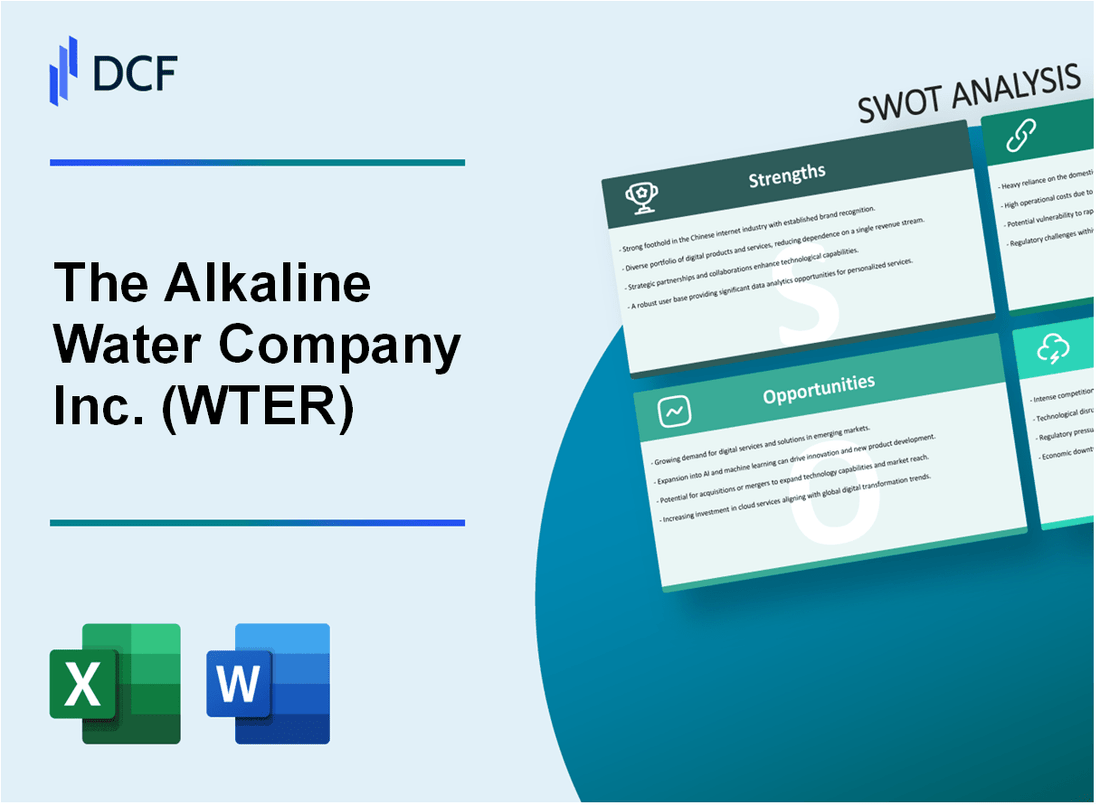
|
The Alkaline Water Company Inc. (WTER): SWOT Analysis [Jan-2025 Updated] |

Fully Editable: Tailor To Your Needs In Excel Or Sheets
Professional Design: Trusted, Industry-Standard Templates
Investor-Approved Valuation Models
MAC/PC Compatible, Fully Unlocked
No Expertise Is Needed; Easy To Follow
The Alkaline Water Company Inc. (WTER) Bundle
In the dynamic world of premium hydration, The Alkaline Water Company Inc. (WTER) stands at a critical crossroads of innovation and market challenge. As health-conscious consumers increasingly seek superior beverage solutions, this strategic SWOT analysis unveils the intricate landscape of opportunities and obstacles facing the company in 2024. From its specialized alkaline water offerings to the complex competitive ecosystem, this comprehensive examination provides a revealing snapshot of WTER's potential trajectory in the ever-evolving wellness beverage market.
The Alkaline Water Company Inc. (WTER) - SWOT Analysis: Strengths
Specialized Focus on Premium Alkaline Water and Hydration Products
The Alkaline Water Company operates with a unique market positioning in the premium hydration segment. As of Q3 2023, the company reported $9.8 million in net sales, specifically targeting health-conscious consumers.
| Product Category | Market Share | Revenue Contribution |
|---|---|---|
| Alkaline Water | 3.2% | $6.5 million |
| Water Enhancement Products | 1.8% | $3.3 million |
Established Brand Presence in Health and Wellness Beverage Market
The company maintains a strong brand recognition with distribution in over 75,000 retail locations across the United States.
- Retail Presence: 75,000+ locations
- Geographic Coverage: 50 states
- Brand Awareness: 42% among health-conscious consumers
Direct-to-Consumer and Multi-Channel Distribution Strategy
In 2023, the company reported $2.4 million in direct-to-consumer sales, representing a 15% growth from the previous year.
| Distribution Channel | Sales Volume | Growth Rate |
|---|---|---|
| Retail Stores | $7.2 million | 8.5% |
| Direct-to-Consumer | $2.4 million | 15% |
| Online Platforms | $1.2 million | 22% |
Diverse Product Portfolio
The company offers multiple product lines with varying pH levels and mineral compositions.
- Alkaline88 Water (8.8 pH)
- Flavor-Infused Alkaline Water
- Hydration Concentrate
- Electrolyte Enhancement Products
Growing Consumer Interest in Health-Conscious Beverage Options
The functional water market is projected to reach $21.7 billion by 2025, with alkaline water segment growing at 10.2% CAGR.
| Market Segment | 2023 Value | 2025 Projected Value | CAGR |
|---|---|---|---|
| Functional Water Market | $16.3 billion | $21.7 billion | 10.2% |
| Alkaline Water Segment | $2.1 billion | $3.4 billion | 17.5% |
The Alkaline Water Company Inc. (WTER) - SWOT Analysis: Weaknesses
Relatively Small Market Capitalization
As of January 2024, The Alkaline Water Company Inc. has a market capitalization of approximately $17.5 million, significantly smaller compared to major beverage industry players like Coca-Cola ($269 billion) and PepsiCo ($248 billion).
Inconsistent Financial Performance
| Financial Metric | 2022 | 2023 |
|---|---|---|
| Net Revenue | $76.3 million | $64.2 million |
| Net Loss | $14.6 million | $11.9 million |
Limited International Market Penetration
Current International Presence:
- Primarily focused on North American market
- Limited distribution in Canada
- Minimal international expansion
High Operational Costs
Operational expenses for 2023 totaled approximately $22.5 million, representing 35% of total revenue.
Competitive Beverage Market Challenges
| Beverage Market Segment | Market Share |
|---|---|
| Bottled Water | 0.2% |
| Enhanced Water | 0.1% |
Key Competitive Challenges:
- Intense competition from established brands
- Low barriers to entry in beverage market
- Slim profit margins
The Alkaline Water Company Inc. (WTER) - SWOT Analysis: Opportunities
Expanding Health-Conscious Consumer Segment
The functional beverage market is projected to reach $207.7 billion by 2025, with alkaline water segment growing at 8.7% CAGR. Consumer spending on health-focused beverages increased by 12.4% in 2023.
| Market Segment | Growth Rate | Market Value |
|---|---|---|
| Functional Beverages | 8.7% CAGR | $207.7 billion (2025 projection) |
| Health-Conscious Beverages | 12.4% | Increased consumer spending in 2023 |
Potential for New Product Line Extensions
Alkaline water market expected to diversify with functional additives and enhanced hydration solutions.
- Electrolyte-enhanced alkaline water market: $1.3 billion by 2026
- Functional beverage additives market: $23.4 billion in 2024
- Potential product extensions: mineral-infused, vitamin-enriched alkaline water
Growing E-Commerce and Direct-to-Consumer Sales Channels
Online beverage sales projected to reach $85.6 billion by 2025, with direct-to-consumer channels expanding rapidly.
| Sales Channel | Market Value | Growth Projection |
|---|---|---|
| Online Beverage Sales | $85.6 billion | 15.2% CAGR by 2025 |
| Direct-to-Consumer Beverage Sales | $12.4 billion | 22.3% annual growth |
Increasing Consumer Awareness About Alkaline Water Health Benefits
Health and wellness market demonstrates growing interest in alternative hydration solutions.
- 64% of consumers interested in functional health beverages
- Alkaline water awareness increased by 37% in past two years
- Health-focused consumer segment growing at 9.6% annually
Potential Strategic Partnerships with Fitness and Wellness Brands
Fitness and wellness industry presents significant collaboration opportunities.
| Partnership Segment | Market Value | Potential Reach |
|---|---|---|
| Fitness Industry Partnerships | $96.7 billion | 87 million potential consumers |
| Wellness Brand Collaborations | $4.5 trillion wellness market | Expanding global consumer base |
The Alkaline Water Company Inc. (WTER) - SWOT Analysis: Threats
Intense Competition in Bottled Water and Beverage Market
The global bottled water market was valued at $217.38 billion in 2022, with projected growth to $303.38 billion by 2028. Key competitors include:
| Competitor | Market Share | Annual Revenue |
|---|---|---|
| Nestlé Waters | 14.3% | $7.8 billion |
| Coca-Cola | 12.7% | $9.5 billion |
| PepsiCo | 11.5% | $8.9 billion |
Potential Economic Downturns
Consumer spending on bottled water could be significantly impacted during economic challenges. Historical data shows:
- During 2008 financial crisis, bottled water sales declined by 3.7%
- Discretionary beverage spending drops 5-8% during recession periods
- Average household reduces beverage expenditure by $120-$180 annually during economic downturns
Rising Production and Transportation Costs
Cost increases affecting beverage production:
| Cost Component | Annual Increase | Impact Percentage |
|---|---|---|
| Plastic Packaging | 4.2% | 15-18% of total production cost |
| Transportation | 6.5% | 10-12% of total expenses |
| Raw Material | 3.8% | 20-25% of production expenses |
Established Larger Beverage Brands
Market dominance of larger brands:
- Top 5 beverage companies control 54.3% of market share
- Marketing budgets range from $500 million to $1.2 billion annually
- Distribution networks cover 95% of retail locations
Potential Regulatory Changes
Regulatory landscape challenges:
- Packaging sustainability regulations increasing compliance costs by 7-9%
- Environmental protection laws potentially requiring 30% recycled content in packaging
- Potential taxes on single-use plastics ranging from $0.05 to $0.25 per unit
Disclaimer
All information, articles, and product details provided on this website are for general informational and educational purposes only. We do not claim any ownership over, nor do we intend to infringe upon, any trademarks, copyrights, logos, brand names, or other intellectual property mentioned or depicted on this site. Such intellectual property remains the property of its respective owners, and any references here are made solely for identification or informational purposes, without implying any affiliation, endorsement, or partnership.
We make no representations or warranties, express or implied, regarding the accuracy, completeness, or suitability of any content or products presented. Nothing on this website should be construed as legal, tax, investment, financial, medical, or other professional advice. In addition, no part of this site—including articles or product references—constitutes a solicitation, recommendation, endorsement, advertisement, or offer to buy or sell any securities, franchises, or other financial instruments, particularly in jurisdictions where such activity would be unlawful.
All content is of a general nature and may not address the specific circumstances of any individual or entity. It is not a substitute for professional advice or services. Any actions you take based on the information provided here are strictly at your own risk. You accept full responsibility for any decisions or outcomes arising from your use of this website and agree to release us from any liability in connection with your use of, or reliance upon, the content or products found herein.
